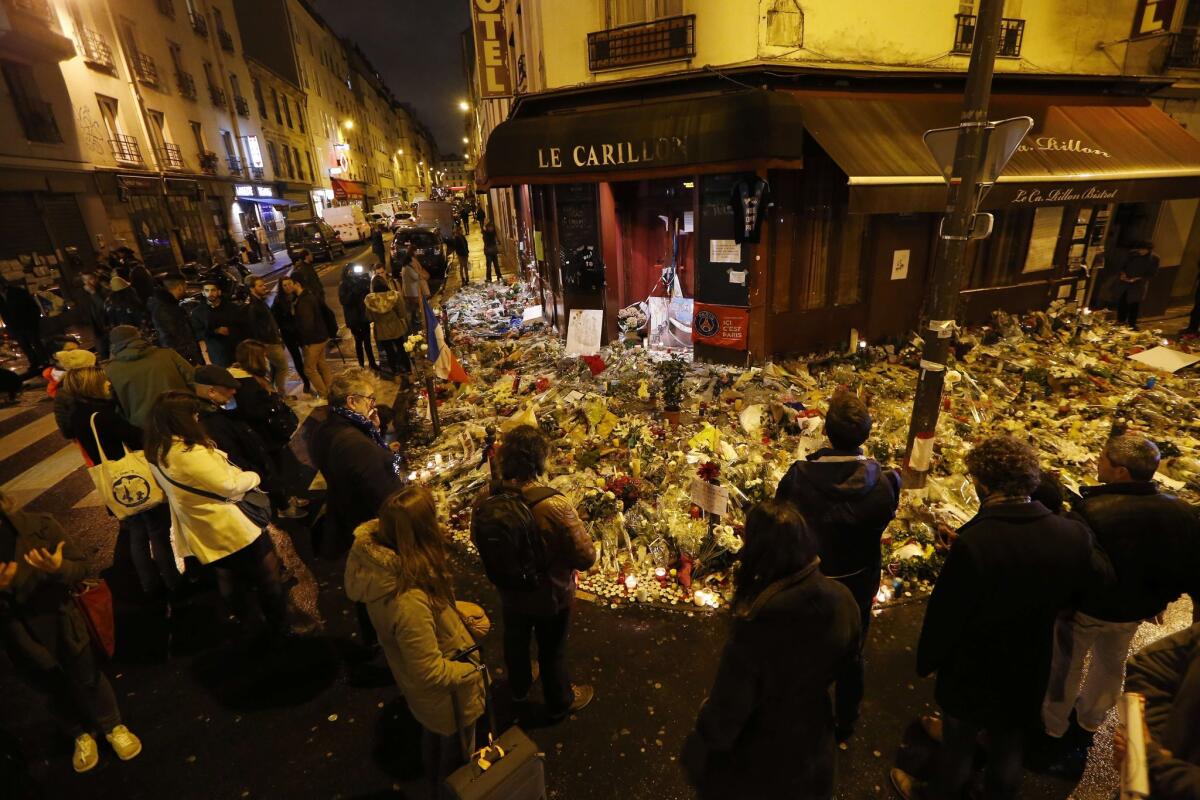Column: Obama is right: Destroying Islamic State will take time and patience, not bluster

People gather at a makeshift memorial to the victims of the deadly attacks in Paris on Nov. 20. French President Francois Hollande plans to visit Washington asking for U.S. help, increasing the pressure on Obama to do more.
President Obama is tired of all the critics who say his strategy to destroy Islamic State isn’t working.
“The only thing that they’re doing is talking as if they’re tough,” he complained last week. “If folks want to pop off and have opinions about what they think they would do, [they should] present a specific plan.”
What the rest of us need, Obama counseled, is more patience. “It’s going to take time,” he said.
The Paris attacks have clearly put the debate over Islamic State and Syria in a higher gear, inside the administration as well as in the presidential campaign.
But the Nov. 13 terrorist attacks in Paris made it hard to be patient, especially for presidential candidates, who quickly produced a flurry of hawkish proposals.
Jeb Bush said he would send U.S. ground troops into Syria to help local forces oust Islamic State from its capital of Raqqah, a measure Obama has ruled out.
Hillary Clinton called for establishing “no-fly zones” and “safe areas” in northern Syria, which she diplomatically called “an intensification” of Obama’s policy. (Obama has called both ideas impractical.)
Marco Rubio has released ideas similar to Clinton’s, an unusual — and unintended — case of bipartisan convergence.
And Donald Trump suggested that U.S. air power alone could do the job. “I would just bomb those suckers,” he said. (Military experts say he’s wrong — more bombing could set Islamic State back but wouldn’t remove it from the territory it holds.)
Obama was right on one count: Most of those plans aren’t very specific. None of the candidates, for example, has offered a clear answer to the “day after” question: If U.S. forces conquered Raqqah, who would govern the city afterward?
But it’s not true, as Obama has claimed, that the only real alternative to his cautious approach is to put 50,000 U.S. troops onto the battlefield. The candidates who favor deploying U.S. troops have suggested smaller numbers (10,000, for example) as part of a coalition that would include Syrian forces. And foreign policy critics who are not running for president have offered more details than the candidates.
Frederic C. Hof, a former Syria expert in Obama’s State Department, argues that the U.S. and France should build a multinational coalition — like the one that fought the Persian Gulf War against Iraq in 1991 — and defeat Islamic State on the ground.
Meanwhile, he said, the U.S. and its allies should build a stronger Syrian opposition movement that could govern any territory the coalition takes.
“Liberated eastern Syria would become, in effect, the mother of all protection zones,” Hof told me. “This will not be a walk in the park,” he acknowledged.
Similarly, James F. Jeffrey, a former U.S. ambassador to Iraq, has argued that a relatively small number of U.S. and other Western troops could take Raqqah.
Then, he suggests, a United Nations peacekeeping force could take over, solving the “day after” problem, at least temporarily, until Syrian civil authorities emerge.
“The answer must not include Western troops as an occupying force,” he said. “That only generates anger in the local population.”
Others have pitched lesser measures: looser rules of engagement, to allow U.S. airstrikes against targets where civilians may be present; more U.S. advisors to help Syrian forces on the ground; and increased military aid to Syrian opposition forces.
Administration officials note that they have already taken initial steps on all three of those fronts and are considering more. Obama approved sending about 50 advisors into Syria last month, for example.
Still, the Paris attacks have clearly put the debate over Islamic State and Syria in a higher gear, inside the administration as well as in the presidential campaign. This week, French President Francois Hollande will visit Washington asking for U.S. help, increasing the pressure on Obama to do more.
None of the critics’ proposals are risk-free. Even the no-fly zone and safe areas that Clinton suggested are more complicated than they appear. A no-fly zone would probably require U.S. forces to destroy Syrian air defense installations. And safe areas would need to be patrolled by ground forces. (Some U.S. officials hope Turkey would shoulder that burden.)
Sending U.S. troops into combat in Syria would add yet another war to the list of Middle Eastern conflicts that have claimed American casualties. And there’s still no off-the-shelf solution to the “day after” problem, no U.N. peacekeeping force or Syrian opposition body that can take over.
So there are real alternatives to Obama’s strategy, but they’re complicated and costly. Destroying Islamic State will still require a heavy dose of patience.
Twitter: @doylemcmanus
Follow the Opinion section on Twitter @latimesopinion and Facebook
More to Read
A cure for the common opinion
Get thought-provoking perspectives with our weekly newsletter.
You may occasionally receive promotional content from the Los Angeles Times.











